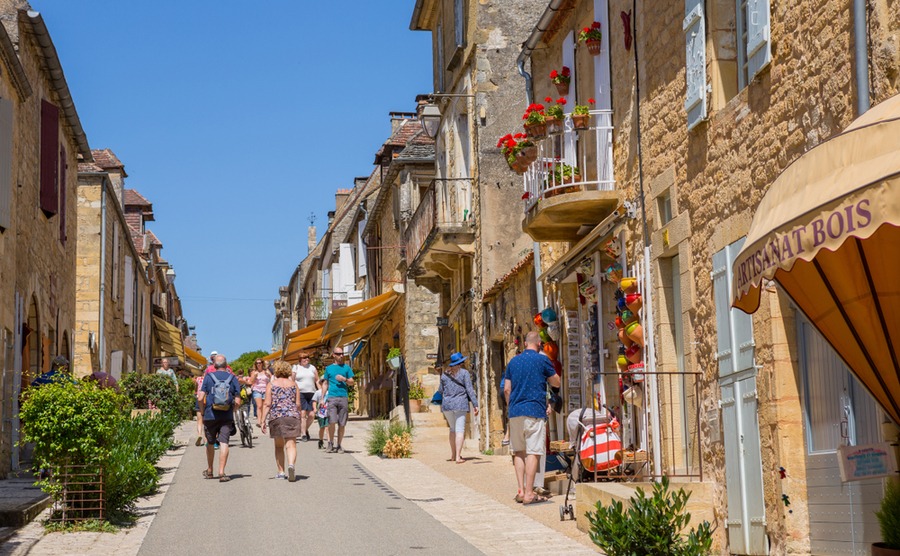What have been the notable changes in France in 2019 – and what’s coming up in 2020? From property price growth to lower taxes, higher wages and a possible end to daylight savings, here’s our round-up.
Property prices continue to grow
Following 3 years of steady growth, property prices in France continued to rise overall in 2019 with FNAIM, the professional body for estate agents, predicting house price increases of up to 3.4% for the rest of 2019 and into 2020. A word of caution though, this average growth is said to hide the fact that whilst prices are rising acutely in some areas, (Bordeaux, Strasbourg and Toulouse are particular examples), in others they are falling so now is the time to choose the area in which you buy wisely. An expert estate agent will be able to help you with local knowledge, as you’ll often find there are ‘micro-markets’, where one village, perhaps classified as one of the ‘Plus Beaux Villages’, can perform much better than a neighbour.
Want to buy in France, but not sure if you can afford it? Find out how to finance your property purchase, and what to budget for, in your free France ‘How to Pay for It’ Guide.
With regards to second home buying in France, 2019 is set to be a record breaking year despite Brexit. This success is said to be as a result of continued and steady demand, restricted availability of property and mortgage prices remaining at historically low levels (the last drop being in April 2019) and is also being driven by confidence in France’s economy. So from a long term perspective now is perhaps the time to invest in French property.
Taxe d’habitation phase-out continues

Many homeowners will see the taxe d’habitation phased out over the coming months. Rui Vale Sousa / Shutterstock.com
One of the big changes in 2019 has been to the taxe d’habitation (occupier tax), one of the two taxes payable on your property in France, due in the last quarter of the year. A slight misnomer, this is not only payable by permanent residents of France but by anyone who owns a property here whether as a permanent residence or second (holiday) home. Previously payable by whoever was living in the property on Jan 1st of that year (whether owners or their renters) and earning over a particular earning threshold it is being phased out gradually, a process that started in 2018 and is expected to finish in 2020. It is, however, worth noting this abolition will not apply to second homeowners who will still be liable for this tax providing the property is capable of habitation and the television licence fee (included in this tax) will still be payable for everyone,
Get in touch with our network of expert estate agents, currency specialists and lawyers – your ‘Golden Three’ – today to kickstart your buying journey.
Higher allowances for business taxes
If you run your own business as an auto-entrepreneur or micro-entrepreneur (a nuance depending on when you set it up), the good news is your CFE tax will only apply if your turnover from your previous income tax year is in excess of 5,000 €. This is a small tax paid by businesses based on the size of your business, where you are located and from which you are automatically exempt for the first year. A welcome relief for those earning a nominal amount, this move has been applauded by small business owners and is specifically designed to encourage small business activity
PAYE finally arrives in France
One of the big changes in 2019 is a change to the income tax system. Previously every resident of France, whether working, retired or employed had to make an income tax declaration in May, despite 50% of the population not being liable to pay any. Foreign residents in France must declare their worldwide income, regardless of it potentially being exempt due to dual taxation rules. From January 1st 2019, France has implemented a pay-as-you-earn system covering various income streams including employment, retirement, rental (including French property rental income of UK residents) and any income not acquired in France. As well as being a big change for France, it should go some way to reducing pressure from the heaving queues and air of confusion at the tax offices in May with not only foreign residents but also the French themselves.
Overtime earnings become tax-exempt
In changes in 2019 for employees, two things happened of note – Firstly money earned for working overtime became tax exempt. In addition the minimum wage (SMIC) was raised as of 1st January by 1.5% to 10.3€ (as opposed to 9.88€ in 2018), which could result for some in a monthly wage increase of 1,500€ for those working a 35 hour week.
Fuel prices remain stable
Let’s start with the good news! The envisioned hikes on both petrol and diesel will not now go ahead, due in part to the pressure placed on the French government by the gilets jaunes.
Make your move simple and stress-free with the help of our recommended removals experts.
In other news, the changes in 2019 see the provision of thousands of new speed cameras called “turret cameras” across France which not only check speed but also can see whether the driver is using a mobile phone or is wearing their seatbelt. Also from the start of this year police have had increased access to files to aid the crackdown on a growing problem in France of uninsured vehicles on the road, which can carry a penalty of up to 3750€ as well as suspension or cancellation of your licence and potentially total confiscation of the vehicle. For expats this may well spell trouble for those residents who have not under the current regulations imported their vehicles to French plates so beware. The costs of breaking down on the motorway has been increased, motorway toll charges have increased dramatically and the cost of car insurance raised slightly.
Fuel prices stay stable, while motorway tolls are up
Let’s start with the good news! The envisioned hikes on both petrol and diesel will not now go ahead, due in part to the pressure placed on the French government by the gilets jaunes.

Hikes to fuel prices will not go ahead.
In other news, the changes in 2019 see the provision of thousands of new speed cameras called “turret cameras” across France which not only check speed but also can see whether the driver is using a mobile phone or is wearing their seatbelt. Also from the start of this year police have had increased access to files to aid the crackdown on a growing problem in France of uninsured vehicles on the road, which can carry a penalty of up to 3750€ as well as suspension or cancellation of your licence and potentially total confiscation of the vehicle. For expats this may well spell trouble for those residents who have not under the current regulations imported their vehicles to French plates so beware. The costs of breaking down on the motorway has been increased, motorway toll charges have increased dramatically and the cost of car insurance raised slightly.
Gas prices cheaper
As they say – with one hand they give, the other they take away. Gas prices fell on January 1st, the second drop in two months following a steep increase in the last quarter of the previous year. Electricity on the other hand was predicted to increase across the year dramatically possibly by up to 2.5%. The cost of stamps also rose with prices increasing by 10%, and as normal, the cost of cigarettes increased twice during the year, once in April and once in November.
What time is it?
And now to possibly the strangest of the changes in 2019 – in March the EU parliament voted to stop changing the clocks twice a year with an option for EU countries to choose either permanent summer or winter time. This potential change may seem in theory like a good idea but we wait to see whether not only this actually comes to fruition in practice but how much chaos it then causes.










